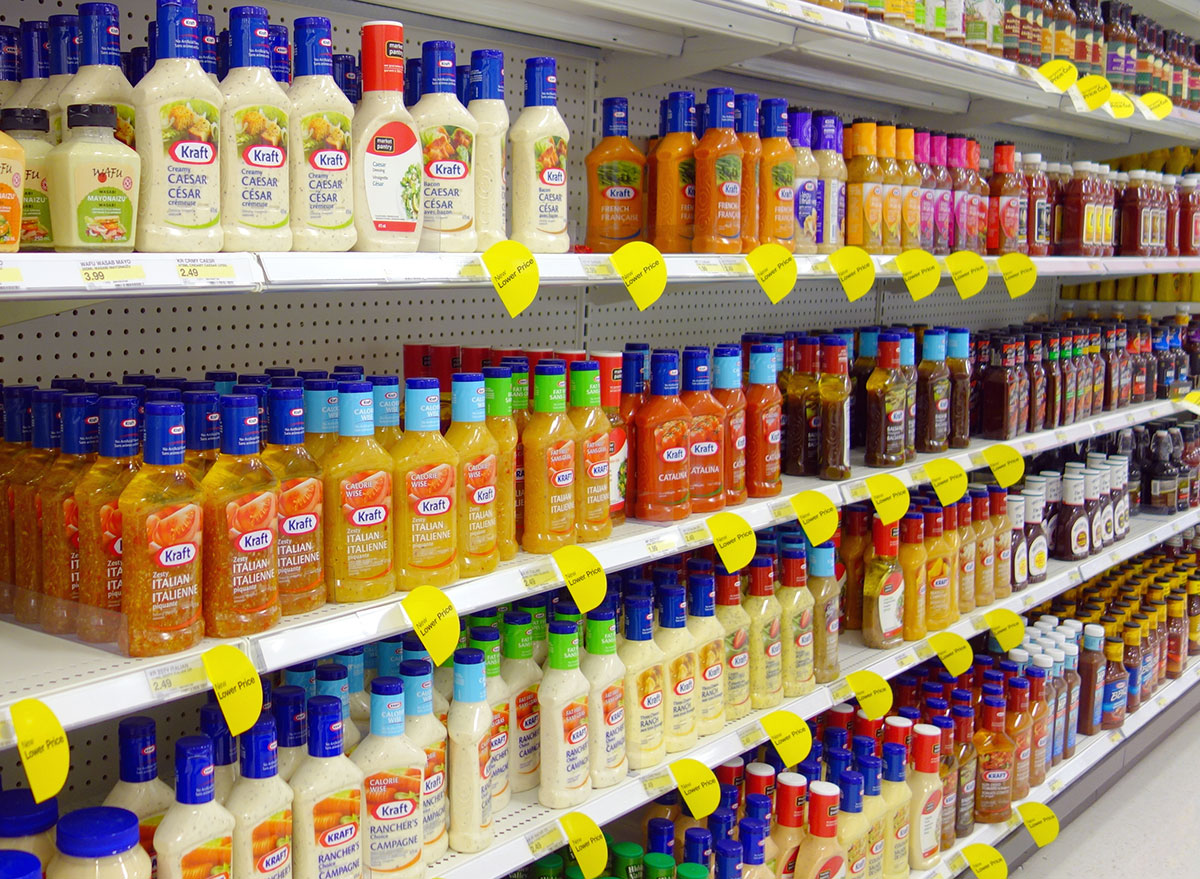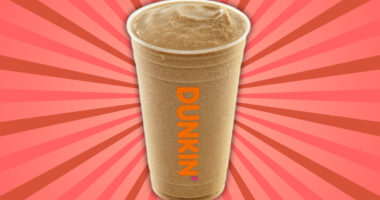The product recommendations in this post are recommendations by the writer and/or expert(s)
interviewed and do not contain affiliate links. Meaning: If you use these links to buy
something, we will not earn a commission.
Salad dressings get a bad rap, but they can contribute to the overall healthfulness of a salad by adding flavor, texture, and nutritional benefits. In fact, putting a heart-healthy dressing on your salad helps you absorb the fat-soluble nutrients A, D, E, and K in your veggies.
We spoke to nutrition experts to find out exactly which Italian dressings they love and recommend, and which ones they say you might want to skip next time you’re at the store.
How to buy the healthiest Italian salad dressing:
When you’re shopping for an Italian salad dressing, follow these dietitian-recommended guidelines to buy the best bottle for your health.
- Quality of oil: Healthy salad dressings often include high-quality oils, such as extra virgin olive oil or avocado oil. These oils are rich in monounsaturated fats, which are considered heart-healthy and can help reduce inflammation in the body.
- Limited added sugars: Many commercial salad dressings contain added sugars, which can contribute to excessive calorie intake. Opting for dressings with little to no added sugars or making homemade dressings using natural sweeteners like honey or maple syrup in moderation can be a healthier choice.
- Portion control: Salad dressings are quite dense in calories as they are mostly a source of fat. Being mindful of portion sizes when using salad dressings is important since the total calories of your salad can easily climb if you aren’t paying attention to how much dressing you’re pouring on. Moderation is key to avoiding excessive calorie intake.
A healthy Italian dressing can enhance the nutritional value of a salad, but of course, the overall quality of the dressing also depends on the ingredients used in the salad itself. Choosing a variety of colorful vegetables, incorporating lean proteins, and adding whole grains or legumes can contribute to a well-balanced, nutritious salad.
Keep reading to find out exactly which dressings our experts recommended, and for more, don’t miss I Tried 12 Fast-Food Salads & One Was Absolutely Perfect.
The Best Healthy Italian Dressings
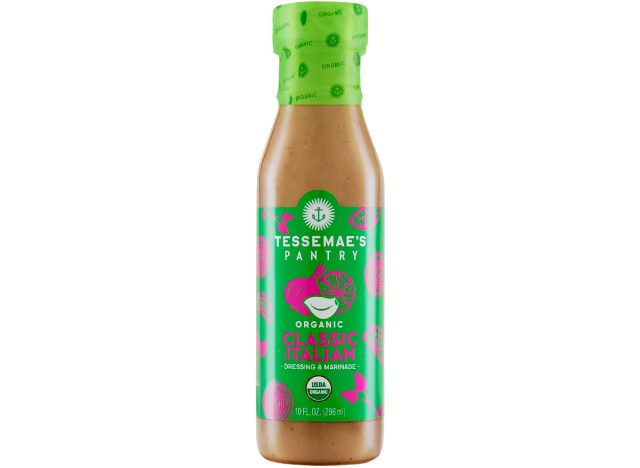

PER 1 TBSP SERVING: 70 calories, 8 g fat (0.5 g saturated fat, 0 g trans fat), 50 mg sodium, 0 g carbs (0 g fiber, 0 g sugar), 1 grams protein
“With an impressive 70 calories and a mere 50 milligrams of sodium per serving, Tessemae’s Italian Dressing is a great salad dressing option! This dressing embodies the perfect balance of flavors, crafted with high-quality ingredients and no artificial additives. Not only does Tessemae’s Italian Dressing offer a delicious flavor, but its low calorie and sodium content makes it an ideal option for weight management and maintaining heart health,” shares Jessie Hulsey RD, an Atlanta-based registered dietitian.
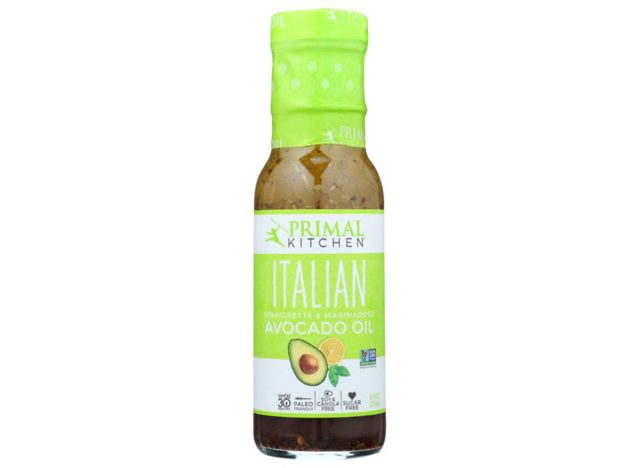

PER 2 TBSP SERVING: 110 calories, 12 g fat (1.5 g saturated fat, 0 g trans fat), 230 mg sodium, <1 g carbs (0 g fiber, 0 g sugar), 0 grams protein
“Primal Kitchen Italian Vinaigrette and Marinade is an avocado oil-based dressing that is made with only quality ingredients, like organic red wine vinegar, organic onion powder, and, of course, avocado oil. It is gluten-free, dairy-free, soy-free, and vegan-friendly, making it a great choice for a wide variety of diets. And since it is sugar-free, it is a staple in my home since I try to limit added sugars whenever I can,” Lauren Manaker MS, RDN, LD tells us.
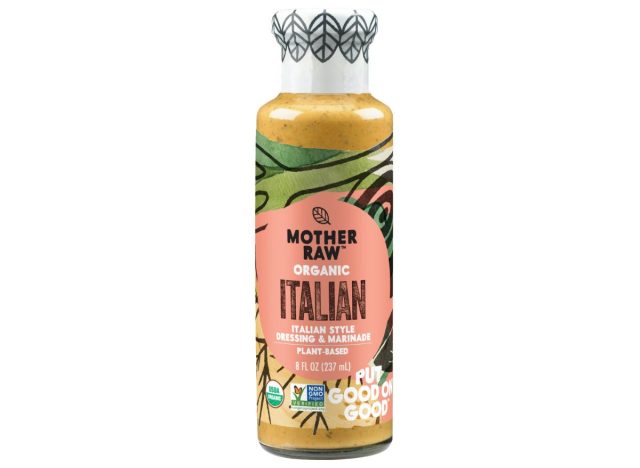

PER 2 TBSP SERVING: 80 calories, 9 g fat (1 g saturated fat, 0 g trans fat), 150 mg sodium, 2 g carbs (1 g fiber, 1 g sugar), 1 grams protein
“Many love the convenience of a bottle of salad dressing but dislike compromising on ingredients. Typical homemade dressings use pure olive oil, but that can be a challenge to find on store shelves, and for an affordable price. Two brands made exclusively with olive oil, and easily found in chain groceries are Mother Raw and Bove’s. These are made with simple ingredients, just like a homemade recipe, and can help with getting in anti-inflammatory omega-9 fats,” says Sharon Puello, MA, RD, CDN, CDCES.
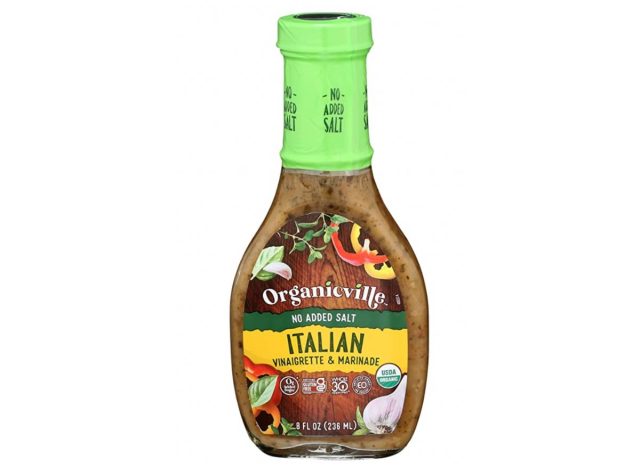

PER 2 TBSP SERVING: 50 calories, 4 g fat (0 g saturated fat, 0 g trans fat), 0 mg sodium, 3 g carbs (0 g fiber, 1 g sugar), 0 grams protein
With zero added salt, this brand is a great option for folks trying to limit sodium, reduce their blood pressure, or risk for heart disease. We love that a two-tablespoon serving only delivers 50 calories and one gram of sugar.
READ RELATED: Ectoin: The New Star Ingredient in Your Skincare Regime
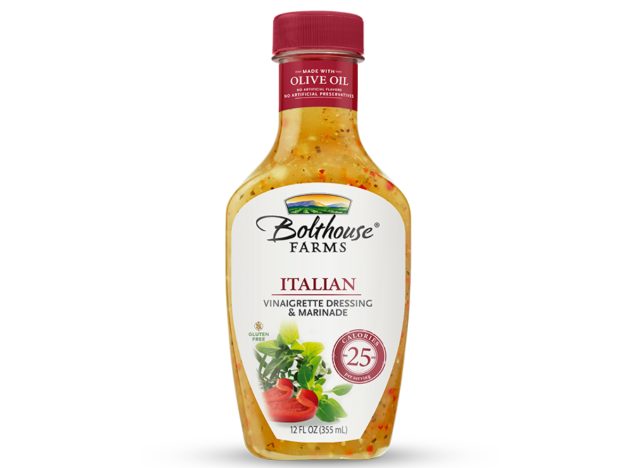

PER 2 TBSP SERVING: 25 calories, 1.5 g fat (1 g saturated fat, 0 g trans fat), 135 mg sodium, 3 g carbs (0 g fiber, 3 g sugar), 0 grams protein
“Bolthouse Farms Italian Vinaigrette is a healthy option for salad dressing due to its natural ingredients and lack of artificial colors, flavors, and preservatives. The dressing is made with healthy, unsaturated fats like olive and canola oil, which can help reduce the risk of heart disease and stroke. It also uses natural sweetness from pineapple juice to balance out the flavors compared to other dressings that use added sugars,” Wan Na Chun, MPH, RD, CPT of One Pot Wellness explains.
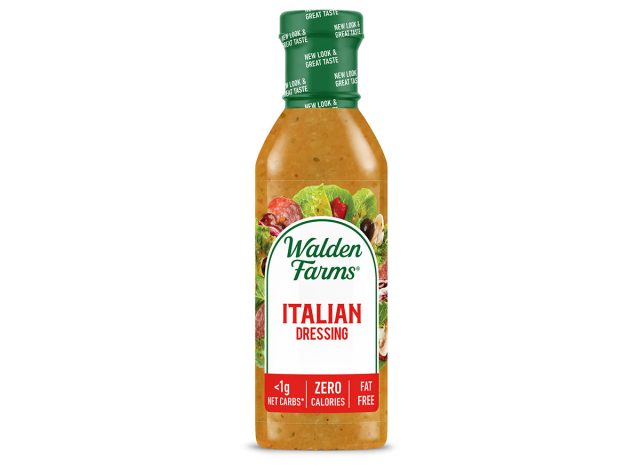

PER 2 TBSP SERVING: 0 calories, 0 g fat (0 g saturated fat, 0 g trans fat), 0 mg sodium, <1 g carbs (<1 g fiber, 0 g sugar), 0 grams protein
“Walden Farms Italian Dressing is a perfect fit for people managing diabetes or people managing their body weight because this salad dressing can truly be used as a flavoring instead of adding calories and fat to your meal. A two-tablespoon serving of Walden Farms Italian dressing has zero calories, zero fat, and less than one gram of carbohydrate,” says Toby Smithson, RD, founder of DiabetesEveryDay.com and author of Diabetes Meal Planning and Nutrition for Dummies.
The Worst Italian Dressings
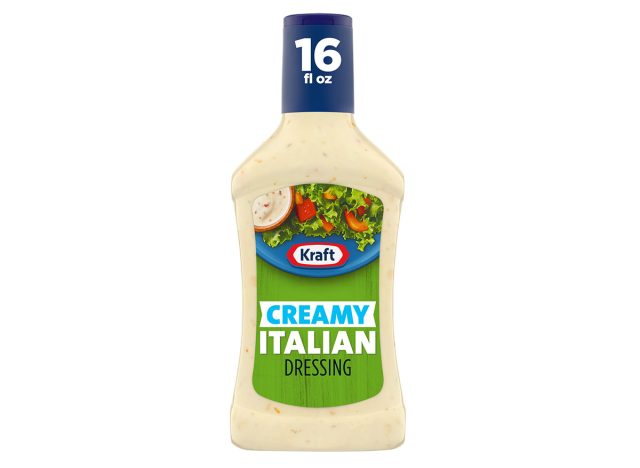

PER 2 TBSP SERVING: 80 calories, 8 g fat (1 g saturated fat, 0 g trans fat), 220 mg sodium, 2 g carbs (0 g fiber, 1 g sugar), 1 grams protein
“Kraft Creamy Italian Salad Dressing is considered an unhealthy option due to its high fat and sodium content, making it a risky choice for those looking to watch their fat intake. Creamy dressings like Kraft Creamy Italian Salad Dressing are generally high in saturated fat and sodium. When choosing a salad dressing, it is important to read the nutrition facts label and choose dressings that are lower in calories, fat, and sodium. It is also important to look for dressings made with healthy, unsaturated fats like olive, canola, or avocado oil,” Wan Na Chun, MPH, RD, CPT of One Pot Wellness says.
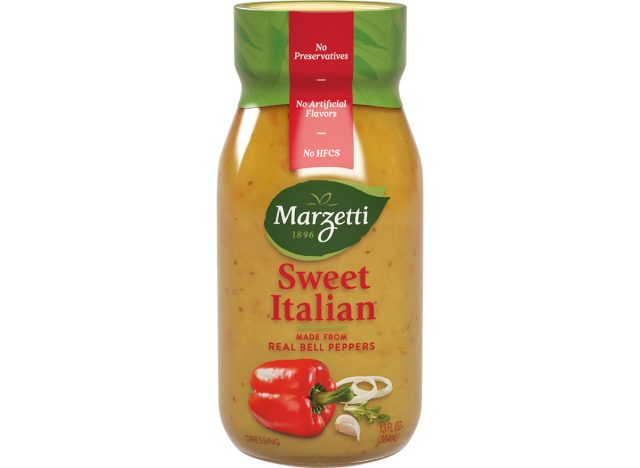

PER 2 TBSP SERVING: 140 calories, 12 g fat (2 g saturated fat, 0 g trans fat), 260 mg sodium, 7 g carbs (0 g fiber, 7 g sugar), 0 grams protein
Sharon Puello MA RD CDN CDCES shares a salad dressing she doesn’t recommend: “One of the worst Italian dressings on the market is Marzetti’s Sweet Italian dressing. With sugar as the third ingredient, it’s no wonder that a standard two-tablespoon serving has 7 grams of added sugar. Though the goal is generally to keep added sugar intake as low as possible given its impact on heart health, the American Heart Association (AHA) actually publishes recommendations for added sugar intake to help guide the public on how much is too much; these recommendations are less than 24 grams daily for women and children and less than 36 grams daily for men. Salad dressing is one area where people tend to go overboard as it’s often assumed to be as healthy as the greens it’s being put on. However, when the dressing is full of sugar, the healthful salad can pack the sugar content of a sweet treat.”
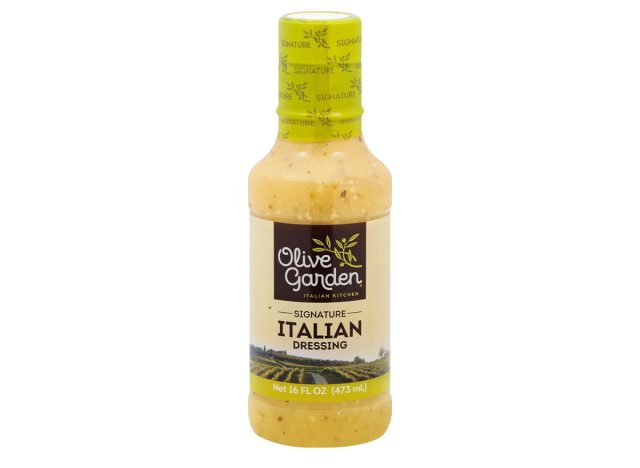

PER 2 TBSP SERVING: 80 calories, 8 g fat (1.5 g saturated fat, 0 g trans fat), 520 mg sodium, 2 g carbs (0 g fiber, 2 g sugar), 0 grams protein
“The first ingredient in Olive Garden Signature Italian Dressing is water (a cheap way to add more liquid), the second ingredient is soybean oil (cheap, industrialized, highly processed oil), and high fructose corn syrup is the fourth ingredient. High fructose corn syrup is an ingredient that’s been linked to obesity and increased triglycerides/LDL cholesterol, which I believe should be phased out of food manufacturing,” says Kayley George, MS, RD, LD.
“It also contains several artificial preservatives, colors, and flavors. Lastly, it contains 520 milligrams of sodium per two-tablespoon serving which makes up 22% of your daily intake. Excess sodium intake is a concern for blood pressure, heart disease, and stroke,” George adds.
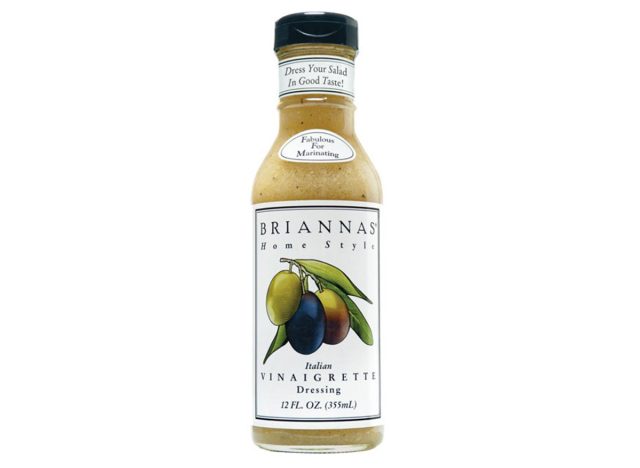

PER 2 TBSP SERVING: 130 calories, 13 g fat (1 g saturated fat, 0 g trans fat), 310 mg sodium, 2 g carbs (0 g fiber, 1 g sugar), 0 grams protein
“The first ingredient in Brianna’s Homestyle Italian Vinaigrette is canola oil, which is a cheaper quality, pro-inflammatory oil. Water is in the top three ingredients, which is a cheap way to add liquid to the product. Sugar is added as the fourth ingredient, which is unnecessary in an Italian dressing. It also has a laundry list of preservatives,” George says.

